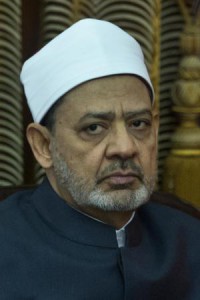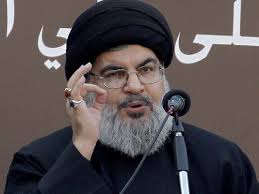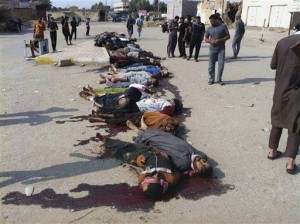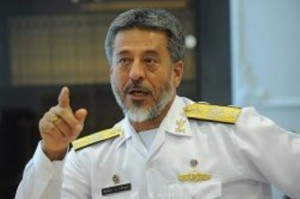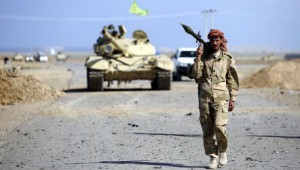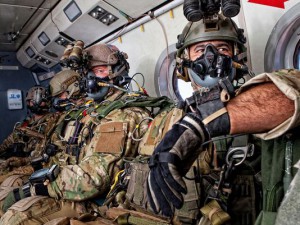Leading Sunni Muslim body Al-Azhar said Sunday the world must unite in a “battle of all humanity” to prevent the Islamic State group from destroying Syria’s ancient city of Palmyra.
The appeal came a day after Syria’s antiquities director said that IS fighters had entered the museum in Palmyra and raised their black flag over the ancient citadel that overlooks the archaeological site.
“Protecting archaeological sites from destruction and plundering is the battle of all of humanity,” the Cairo-based Al-Azhar, a prestigious seat of Islamic learning, said in a statement.
“We have to unite our efforts in order to protect one of the most important archaeological cities in the Middle East from being destroyed by Daesh,” it said, using an Arabic acronym for IS.
Al-Azhar said the international community must take urgent steps to prevent IS “from destroying the cultural and archaeological landmarks of the city” as it did in Iraq and other parts of Syria.
IS seized Palmyra on Thursday, sparking international concern for the 2,000-year-old UNESCO World Heritage site which is home to colonnaded alleys, elaborately decorated tombs and Greco-Roman ruins.
The jihadists are notorious for demolishing archaeological treasures since declaring a “caliphate” last year straddling Iraq and Syria.
They triggered outrage this year when they blew up the ancient Assyrian city of Nimrud and smashed artefacts in the Mosul museum, both in Iraq.
Al-Azhar said that Islamic sharia law forbids the destruction of world heritage sites and artIfacts.
Nasrallah: the US can’t protect anyone in Syria, Iraq or Lebanon from Islamic State
Hezbollah leader Hassan Nasrallah warned Sunday that the United State can not protect anyone in Syria, Iraq or Lebanon from the radical Islamic State group.
Beirut-based newspaper The Daily Star cited the leader of the Shi’ite Lebanese organization as calling on his country’s population and that of the region to confront the threat posed by group formerly know as ISIS that seeks to reestablish a medieval caliphate in the Middle East.
Nasrallah – a staunch opponent of Islamic State – expressed his strident warning against the group that has taken control of swaths of land in Lebanon’s neighboring Syria and Iraq, saying silence over the threat would not ensure safety.
Iran agrees ‘managed access’ to military sites
Iran has agreed to grant United Nations inspectors “managed access” to military sites as part of a future deal over its contested nuclear program, a negotiator said Sunday, apparently contradicting earlier comments by the nation’s supreme leader.
Iranian Deputy Foreign Minister Abbas Araghchi’s comments, carried by state television, came after he and Foreign Minister Mohammad Javad Zarif attended a reportedly stormy closed session of parliament.
“Iran has agreed to grant managed access to military sites,” state TV quoted Araghchi as saying Sunday.
Lawmaker Ahmad Shoohani, a member of parliament’s National Security and Foreign Policy Committee who attended the closed-door session, said restricted inspections of military sites will be carried out under strict control and specific circumstances.
“Managed access will be in a shape where U.N. inspectors will have the possibility of taking environmental samples from the vicinity of military sites,” Shoohani said.
Iran’s supreme leader, Ayatollah Ali Khamenei, vowed Wednesday to not allow international inspection of Iran’s military sites or access to Iranian scientists under any nuclear agreement. Iran’s military leaders also angrily have refused such demands. The state TV report did not elaborate on Araghchi’s comments apparently contradicting those two powerful forces in the Iranian government.
Iran and six world powers — the U.S., Russia, China, Britain, France and Germany — hope to work out terms of a final nuclear deal before a June 30 deadline. Inspection of military sites suspected to be taking part in the nuclear program is a top priority of the U.S.
The West fears Iran’s program could allow it to build a nuclear weapon. Iran says its program is for peaceful purposes.
The broadcast also quoted Araghchi as saying Iranian negotiators rejected demands that its scientists be interviewed.
“Americans are after interviewing our nuclear scientists. We didn’t accept it,” state TV quoted him as saying.
Iran’s nuclear scientists have been the targets of attacks before both inside the Islamic Republic and elsewhere. The country also views the interviews as tantamount to a criminal interrogation.
Iran general says army needs more funds to counter Islamic State
A senior Iranian military official told parliament Sunday the armed forces need a bigger budget to confront the ISIS whose influence is growing in neighboring countries.
“We have to face a new threat in the region. Terrorist groups are close to our borders,” General Ahmad-Reza Pourdastan who commands Iran’s ground forces told parliament, media reported.
“Today we see the presence of Daesh in Afghanistan and Pakistan,” he said, using the Arabic acronym for ISIS.
Iran’s army and its elite Revolutionary Guards must be strengthened to be able “to buy tanks, transport vehicles and to overhaul our helicopters,” he was quoted as saying.
ISIS, which has seized chunks of Syria and Iraq to the west of Iran has also gained a foothold in its eastern neighbours Pakistan and Afghanistan.
The commander of NATO forces in Afghanistan, General John F Campbell has said that ISIS was recruiting fighters in Afghanistan, but are not yet operational there.
“There’s recruiting going on in Afghanistan, there is recruiting going on in Pakistan. There is money being passed back and forth,” he told reporters on Saturday in Kabul.
In May, ISIS claimed its first attack in Pakistan, where pistol-wielding gunmen stormed a bus carrying members of the minority Shiite Ismaili community, killing at least 43 people.
The Iranian general, who warned that “the battle is on the ground”, did not say by how much the defence budget should be increased.
For the fiscal year ending in March 2016, the defence budget was increased by more than 30 percent to reach some $10 billion dollars. In addition, the armed forces receive $1.2 billion from sovereign funds.
Pourdastan told parliament that when IS launched its offensive in Iraq in June last year jihadists advanced to Jalula, just 40 kilometers from the Iranian border.
“In less than three days, we sent five brigades to the borders and our reconnaissance helicopters penetrated 40 kilometers into Iraq,” Pourdastan added.
Shiite regional power Iran has military advisers in Iraq and Syria and provides financial and military support to the governments of both countries in their fight against the Sunni extremists.
With Syria’s Army losing ground, a boost from Hezbollah
The dirt roads on the border between Syria and Lebanon wind across a mountain range dotted with little wild flowers.
It’s windswept and deserted except for a few hilltop outposts with clumps of gray tents, machine-gun nests and flags that fly the green and gold colors of Lebanon’s Hezbollah movement.
These posts are new. In a three-week offensive, Hezbollah has worked with Syrian government forces and other allies to push rebel fighters out of a chunk of territory that the rebels held along this border for two years.
Hezbollah says it’s still firing at rebels who are less than a mile away
The group organized a press trip weaving into Syrian territory from Lebanon and made a commanding officer available for interviews in the field – though he was only identified by his nickname, Hajj Nader.
He says is that Hezbollah has faced a tough fight. The rebels were well-armed – their shell casings still litter the ground — and their morale was high.
“They fought like they had nothing to lose,” says the stocky man, with dark glasses and a short, dark beard.
Across Syria, rebel fighters have been taking territory recently from President Bashar Assad’s forces. Many of these opposition fighters belong to either the self-declared Islamic State or to al-Qaida. In the past week, Syrian regime forces lost the city of Palmyra and a border crossing with Iraq.
Hezbollah is considered Assad’s most competent ally, and its victory here is the best news for Assad in weeks, which is perhaps why the usually insular group is now inviting groups of journalists to the front line.
Hezbollah analyst and author Nick Blanford thinks thinks both Assad and Hezbollah needed to highlight a win. Hezbollah needed to show its grassroots supporters that “this is not our Vietnam, we are winning this war, we are defending the borders of Lebanon,” says Blanford. “And more broadly, of course, for the Assad regime it gives the message of a victory that – not all is lost.”
But for all the triumphalism, this is just a small part of Syria. Blanford says there are not enough Hezbollah fighters to solve Assad’s rebel problem
“Hezbollah are good fighters but it’s a question of numbers,” he says. The group has strong backing from Iran, as does Assad’s army, but Blanford says the group only has about 5,000 active duty Hezbollah fighters and they can’t prop up Assad’s forces alone.
“If you are looking at the forces loyal to the Assad regime, chiefly the Syrian army,[they’re] utterly exhausted after four years of fighting,” Blanford says.
Hezbollah’s leader Hassan Nasrallah has vowed to protect Assad. That would satisfy the group’s obligations to Syria and Iran.
Up in the mountain, the men say their priority is to protect their homeland, as they look down on Lebanese villages. And even here on the border they’re spread thin – a formidable force maybe but seemingly not one that can save Assad by itself.
Islamic State kill 400 people mostly women and children in Palmyra
The Islamic State of Iraq and Syria (ISIS) terrorist group militants have killed at least 400 people mostly women and children in the ancient city of Palmyra.
According to the Syrian state television, the mass killing by the ISIS militants was carried out after the city fall to terror group’s control.
An image of an ancient castle in the area was posted with a black flag flying above it was posted online by one of the group’s supporters.
The ancient was reportedly captured by the ISIS militants on Wednesday with the opposition activists saying hundreds of bodies were seen in the streets following the fall of the city, Reuters reported.
The activists also added that those killed by the ISIS militants were believed to be government loyalists.
The ancient Palmyra city is home to renowned Roman-era ruins including well-preserved temples, colonnades and a theatre and is a Unesco world heritage site.
Fresh air strikes and ground fighting starts in Yemen
The warplanes launched a fresh wave of air strikes across Yemen on Saturday targeting rebels as fighting raged on the ground in the south of the country, witnesses said.
The air raids pounded arms depots under the control of rebels in the locality of Ghula, in Omran province north of Sanaa, residents said.
They followed similar bombardments of weapons storage facilities in the capital that sparked deadly explosions, and strikes on the Dhabwa military base, which is currently under rebel control.
In the western province of Hodeida, a military airport was twice bombed by coalition warplanes, according to residents.
The Arab coalition has stepped up raids on positions held by the Huthis and their allies since a humanitarian ceasefire ended late on Tuesday.
At Hajja in the north of the country, a gathering of Huthis was struck, killing at least 12 of the fighters, witnesses reported.
Air strikes also attacked rebel positions in Dhamar, officials there said, while tank and mortar fire sounded across some sectors of the central region where heavy fighting took place, according to tribal sources.
In southern Yemen, warplanes targeted rebels locked in combat with tribesmen in Ataq, the capital of Shabwa province, military officials said.
The fighting killed at least 28 people, including 17 Huthis and 11 tribesmen, the sources said.
In Aden, clashes raged in the north, east and west of the port city between rebels and fighters loyal to President Abedrabbo Mansour Hadi, military sources said.
The coalition launched the air campaign against the Huthis on March 26 after the rebels seized the capital and advanced on Hadi’s stronghold of Aden, forcing him to flee to Riyadh.
The United Nations, which plans to hold a conference on Yemen in Geneva next week, says the violence has killed more than 1,000 people and displaced close to half a million more.
Navy Commander: Iranian flotilla present in Gulf of Aden
The Commander of Navy said that 34th flotilla of Iranian Navy is still present in the Gulf of Aden.
The 34th flotilla including Bushehr logistic ship and Alborz destroyer has been dispatched to north Indian Ocean and Gulf of Aden and Bab el-Mandeb Strait since April 8.
Rear Admiral Habibollah Sayyari told IRNA on Sunday that the flotilla is patrolling in the Gulf of Aden and Bab el-Mandeb to provide security in the region and escorting ships in the area.
Sayyari had already announced that mission of the 34th flotilla would take 90 days and after that the 35th flotilla will enter the area.
Shia militias and the Iraqi military launches offensive to retake Ramadi
Debate must start NOW to send in ground troops to fight Islamic State
The UK must confront IS in Syria and Iraq by putting fighting troops on the ground. To do anything else will enable radical Islam to continue marching on through North Africa and potentially into southern Europe and the Balkans – the historic high water mark of Islam in the 14th and 15th centuries.
That is the chilling analysis of former UK army chief Lord Dannatt. Writing in today’s Mail on Sunday he also warned that “the United States might think it enjoys the security of the Atlantic between itself and where IS wants to expand, it cannot forget the domestic terrorist threat.”
Dannatt’s call acknowledges that such a deployment would be costly in terms of blood and treasure however difficult judgements must be made. He wants a public debate on the matter and he says it should start now. Here is an excerpt from his argument in the Mail:
“I am no gung-ho general who says ‘just send the boys in and don’t worry about the body-bags’, far from it, but faced with such a lethal and uncompromising enemy as IS – and with the lack of political and diplomatic solutions at our disposal – we can no longer afford to rule out ‘boots on the ground’.
“What I am calling for today is for a public and political debate to begin immediately, so that the arguments for and against the deployment of Western ground forces can be aired.
“It must start now because already so much precious time has been lost – in particular because of the General Election, in the run-up to which the incumbent Prime Minister and leaders of the other major parties adopted the mantra that wars are simply too politically toxic to be discussed.
“An opportunity to generate public support for a fully-fledged military intervention was lost, so we have got to start talking about and planning for a potential deployment now. Planning is one thing, a decision to commit is another, and could come later.”
Dannatt concluded by saying that he did not have all the answers. He simply wants an open, honest public debate, writing: “To those who would be wholly opposed to such a deployment, I would say do we really want to do nothing and simply watch what happens?”
- « Previous Page
- 1
- …
- 352
- 353
- 354
- 355
- 356
- …
- 401
- Next Page »
